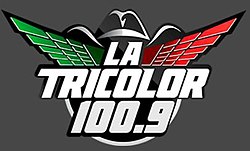KMIX
 | |
| Broadcast area | Stockton, California |
|---|---|
| Frequency | 100.9 MHz |
| Branding | Tricolor 100.9 |
| Programming | |
| Format | Regional Mexican |
| Ownership | |
| Owner |
|
| History | |
First air date | December 14, 1966[1] |
Former call signs | KSRT (1967–1981)[2] KWGF (1981[2]-1983)[3] KYBB (1983[3]-1990) KSGO (1990–1992)[4] KEXX (1992–1995)[4] |
| Technical information[5] | |
Licensing authority | FCC |
| Facility ID | 60420 |
| Class | A |
| ERP | 6,000 watts |
| HAAT | 100 meters (330 ft) |
Transmitter coordinates | 37°37′29″N 121°23′57″W / 37.62472°N 121.39917°W |
| Links | |
Public license information | |
| Webcast | Listen Live |
| Website | radiolatricolor.com/stockton-modesto/ |
KMIX (100.9 FM, "La Tricolor 100.9") is a radio station broadcasting a Regional Mexican format. Licensed to Tracy, California, United States, it serves the Stockton area. The station is currently owned by Entravision Communications.
History
[edit]The station began broadcasting December 14, 1966.[1] For many years, the station was a sister station to KWG. The station's original call sign was KSRT (for Stereo Radio Tracy). From the late 1960s to the early 1970s, the station aired a Spanish language format.[6][7] In the early to mid 1970s (1973) through the very early 1980s (1981) KSRT aired an album-oriented rock format.[8][9] On May 6, 1981, the station's call sign was changed to KWGF.[2] In 1983, the station's call sign was changed to KYBB[3] (B-101). From the mid to late 1980s, the station aired an adult contemporary format.[10][11] By 1989, the station was airing an Oldies format,[1][12] and on June 26, 1990, the station's call sign was changed to KSGO[4] (Stockton's Golden Oldies). On December 1, 1992, the station's call sign was changed to KEXX[4] (Xtra 101). By 1995, the station's oldies format had evolved to a playlist centered on hits of the 1970s.[13][14]
KEXX dropped 1970s oldies for country music in 1995, changing its letters to KMIX.[15] By 1997, KMIX was airing a Spanish language format.[16]
References
[edit]- ^ a b c Broadcasting/Cable Yearbook 1989, Broadcasting & Cable, 1989. p. B-45. Retrieved June 23, 2018.
- ^ a b c History Cards for KMIX, fcc.gov. Retrieved June 22, 2018.
- ^ a b c "Call Letters", Broadcasting, October 10, 1983. p. 112. Retrieved June 22, 2018.
- ^ a b c d Call Sign History, fcc.gov. Retrieved June 22, 2018.
- ^ "Facility Technical Data for KMIX". Licensing and Management System. Federal Communications Commission.
- ^ Broadcasting 72' Yearbook, Broadcasting, 1972. p. B-30. Retrieved June 25, 2018.
- ^ Broadcasting Yearbook 1977, Broadcasting, 1977. p. C-30. Retrieved June 25, 2018.
- ^ Broadcasting Yearbook 1978, Broadcasting, 1978. p. C-30. Retrieved June 24, 2018.
- ^ Broadcasting Yearbook 1980, Broadcasting, 1980. p. C-32. Retrieved June 24, 2018.
- ^ Broadcasting Cablecasting Yearbook 1986, Broadcasting/Cablecasting, 1986. p. B-41-42. Retrieved June 23, 2018.
- ^ Broadcasting/Cablecasting Yearbook 1988, Broadcasting/Cablecasting, 1988. p. B-42. Retrieved June 23, 2018.
- ^ Unmacht, Robert (1989). The M Street Radio Directory. p. S-45. Retrieved June 23, 2018.
- ^ Broadcasting & Cable Yearbook 1995, Broadcasting & Cable, 1995. p. B-59. Retrieved June 24, 2018.
- ^ Unmacht, Robert (1995). The M Street Radio Directory. p. 117. Retrieved June 24, 2018.
- ^ "Vox Jox" (PDF). Billboard. Vol. 107, no. 11. March 18, 1995. p. 78.
- ^ Broadcasting & Cable Yearbook 1997, Broadcasting & Cable, 1997. p. B-65. Retrieved June 24, 2018.
External links
[edit]- Facility details for Facility ID 60420 (KMIX) in the FCC Licensing and Management System
- KMIX in Nielsen Audio's FM station database
